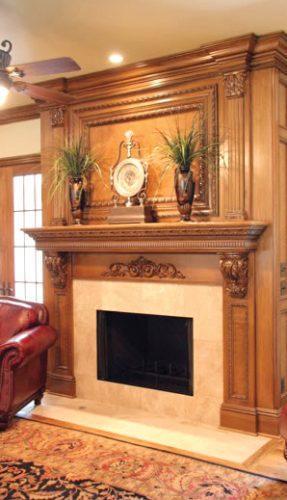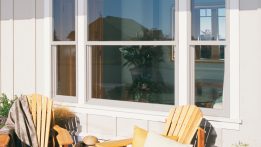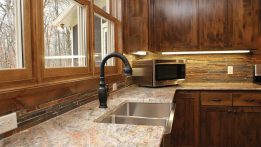
Looking for a simple, inexpensive way to turn an aging family room into a dazzling showcase? Inspired design professionals will tell you one of the most popular and cost-effective ways to transform a plain space into a room with sizzle is to adorn it with millwork crafted from American hardwoods.
Linda Jovanovich of the American Hardwood Information Center, agrees and reminds us that, “From intricate crown moldings and filigreed fireplace mantels to traditional wainscoting and baseboard trim, generations of designers and homeowners have counted on hardwood mouldings and millwork to add warmth, character, and beauty to their favorite living spaces.” So let’s get started!
Where has all the millwork gone?
Years ago, most American homes were built with at least a minimum level of interior ornamentation. Builders used hardwood details to make each residence unique, reflecting the individuality and taste of their owners. Unfortunately, after World War II, the popularity of millwork began to wane. Builders sacrificed craftsmanship for speed in order to keep pace with an unprecedented demand for new homes in the country’s booming suburbs.
Today, most new homes in America continue to be built with time and cost-efficiency in mind, leaving homeowners with few options for endowing their residences with a sense of individuality. But that doesn’t mean homeowners have to settle for cookie-cutter designs.
What’s a homeowner to do?
 Susan Muschweck, a Pittsburgh-based interior designer, says painting walls and upgrading floors is a great way to dress up a listless space, but for many clients, she often suggests another cost-effective option.
Susan Muschweck, a Pittsburgh-based interior designer, says painting walls and upgrading floors is a great way to dress up a listless space, but for many clients, she often suggests another cost-effective option.
“I like to recommend hardwood molding,” she says. “Trim brings a room to life. And by using hardwood, you really add permanent warmth, distinction, and value to your home.”
To make the best of your hardwood investment, Muschweck says consistency is critical. “When adding millwork, use crown, baseboard, and other millwork patterns that complement each other,” she explains.
“Be sure to maintain the same style throughout your home, but capitalize on the design flexibility different spaces offer. In the dining room, for example, choose wainscoting or a chair rail to create a sense of charm or formality.”
What’s the best wood to use?
Nothing stands up to wear and tear better than American hardwoods, yet experience tells Pittsburgh architect Mary Cerrone that certain hardwood species are more suited to particular applications than others.
“For millwork that is likely to get bumped or beat-up, such as window and door casings, baseboards, paneling and chair rails, I suggest using a harder species, like white oak,” she says. “For moldings and millwork in less accessible areas-especially those that will be painted-homeowners can save money by using less expensive hardwoods, such as poplar.”
Imagination makes millwork affordable
Custom molding can be pricey, but the American Hardwood Information Center says there are simple, creative ways to get the custom look you want, at a cost you can afford.
“Lumber supply centers and home improvement stores can have up to 350 styles of off-the-shelf molding patterns available,” Linda Jovanovich tells us. “Combining or ‘stacking’ two or more stock molding ‘profiles’ creates the effect of a single, hand-carved piece of wood and provides the unique look of custom millwork at a fraction of the cost.”
Or, achieve the look of a more expensive hardwood, like cherry, by using a cherry stain on a less expensive hardwood. This technique works especially well in decorative applications above eye-level, such as crown molding and recessed ceiling patterns. ![]()




